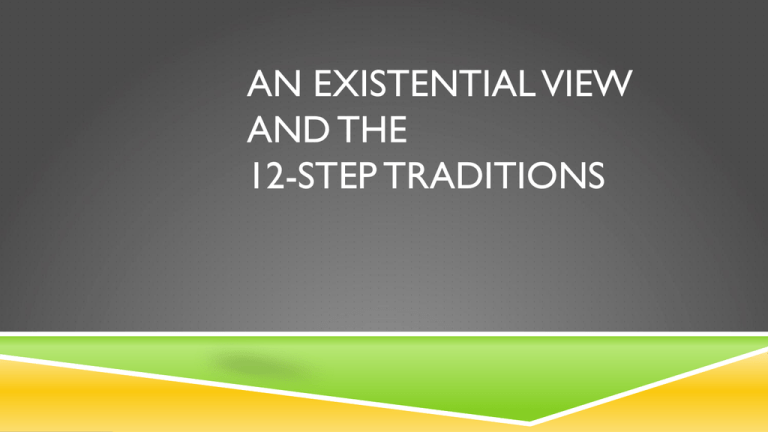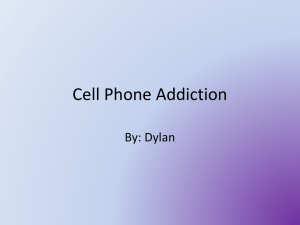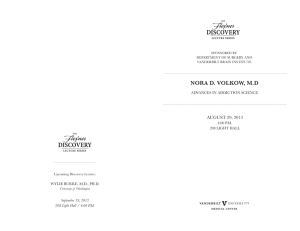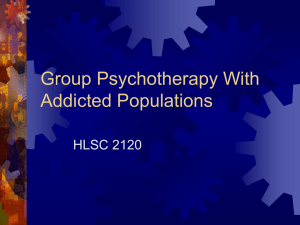AN EXISTENTIAL VIEW AND THE 12-STEP TRADITIONS
advertisement

AN EXISTENTIAL VIEW AND THE 12-STEP TRADITIONS LIMITATION OF BEING We admitted we were powerless over alcohol / behaviors Acceptance of our limitations Understand our vulnerability and embrace it We are not in control of our alcoholism nor purely of ourselves (e.g., Not- God-ness) Limited Control – Limited Dependence Warned against promising never to drink again Learn rather “not to take first drink”, and “one day at a time” “God grant me the serenity to accept things I cannot change, the courage to change the things I can, and the wisdom to know the difference” I CHOSE TO DRINK HITTING BOTTOM: AN EXISTENTIAL VIEW POINT The Abyss Acceptance of limitation sometimes requires a wrenching away and ruthlessly exposing false assumptions and deceptive facades Emotional upheaval is required to before individuals will truly question core of their existential predicament The eye begins to see, I meet my shadow in the deepening shade; I hear my echo in the echoing wood-A lord of nature weeping to a tree, I live between the heron and the wren, Beasts of the hill and serpents of the den. What's madness but nobility of soul At odds with circumstance? The day's on fire! I know the purity of pure despair, My shadow pinned against a sweating wall, That place among the rocks--is it a cave, Or winding path? The edge is what I have. A steady storm of correspondences! A night flowing with birds, a ragged moon, And in broad day the midnight come again! A man goes far to find out what he is—Death of the self in a long, tearless night, All natural shapes blazing unnatural light. Dark, dark my light, and darker my desire. My soul, like some heat-maddened summer fly, Keeps buzzing at the sill. Which I is I? A fallen man, I climb out of my fear. The mind enters itself, and God the mind, And one is One, free in the tearing wind. THE ABYSS The Journey of the addict takes her/him into the bottom of an abyss where we surrender and begin the ways of transformation or we may instead begin to rot in hellish proportions In the abyss we look straight in the face of our humiliation and demise and here is the place of asking for support We are fearful of the abyss and yet fascinated at the same time Is this not the impetus for addiction itself? WHAT IS THIS PREDICAMENT? Bad faith – we don’t want to face reality on realities terms Hanging onto illusion – we don’t want to face death, terror, and suffering in life Two real truths in life – We are going to die, and after death there is nothing CREATIVE CHAOS Open to authenticity Our very being is to question what it means to be - this is what our addictions are asking of us (Heidegger) If we must enter the chaos to create ourselves (to rediscover) we must be prepared to accept discomfort, anxiety, restlessness, frustration, boredom, loneliness, fear, panic, depression, tears, laughter, hunger, desire, brooding, silence, and finally the expression of a new being Most of the above experiences are what we are trying to avoid in our addiction - paradoxically - addiction can manifest all of the above. We then may ask ourselves Who is experiencing these modes of “being”? ENGAGE IN A JOYFUL PARTICIPATION OF THE SUFFERING IN THE WORLD Learn to suffer without too much pain Removal of cheap thrills and tricks and replace them with authentic earned happiness Morality is not properly the doctrine of how we make ourselves happy: but how we make ourselves worthy of happiness Happiness is a happening – it happens to us – not manufactured (don’t suffer for wrong reasons) FINDING MEANING IN SUFFERING WHAT DID YOU SEE? WHAT ARE YOUR FEELINGS OTHER THOUGHTS BECKER AND BATESON There is no self to control unless one is operating under the illusion that one is separate from oneself and others I think the world is full of too many cheerful robots who only talk about joy and the good things… My task is to talk about the terror and suffering in the world Joy, hope, and trust are things one achieves after one has been through the forlornness BIG QUESTIONS FOR OBSERVERS OF ADDICTED SUFFERERS Why are addicts so reluctant to seek treatment? Why must they hit bottom before they will ever admit that their addicted? Why does everyone else know they are alcoholics and what blinds them to miss this reality? ANXIETY AND ALIENATION Denial and self-deception (pervasive universal characteristic) State of isolation State of anxiety Leads to existential crisis – he or she is no longer part of the whole and has no real freedom to choose SELF DECEPTION AND DENIAL HEIDEGGER AND THE IDEA OF SCHULD (GUILT) We think we can pay off our debt to the Moneylender, thereby becoming free of guilt as though we were objects that could be completed But, since as Heidegger proposes, we are not the source of our own being, and don’t have total control, we cannot be perfect Thus, our real guilt may stem from (not being) or remaining committed to actualize our potential at the core of our being. Living an objectified existence keeps us in a “purgatory of guilt” on earth - that can never be eschewed which keeps us from becoming human BARGAINING WITH THE ADDICTED SELF Making bargains with the addicted self is an attempt to cover the nothingness–or gap in our being In addiction we avoid facing the nothingness – (open place that is also dark face of wholeness) and because we become objects early in our development we lose the mystery of who we are and the creative potential to mold the mystery that we are. Ultimately we must face the addicted self and its death TRUE RELATING In harmony with the universe Open to experience of true relating More than a rational animal – don’t need confirmation of their own being Need to have a presence in the being “of the other” … “We are nothing in ourselves” Rights, Guilt as a Killer, “I Can Remain In Control” Carried away with the Killer’s energy and driven by the addicted self the addict believes they have a right to their addiction They are superior to others and justified in their actions (nihilistic) But this stance is contradicted by the emotions that the person feels For guilt is a killer and maybe the measure of possibility for transformation But the act of transformation (step toward recovery) is frequently curtailed by the addicts’ philosophy of “I” (can remain in control) 20 “Self Will Run Riot” - I am Not Ordinary Half hearted glimpses at listening deeply to our guilt “Self will run riot” the mind of the killer is addicted to power and diabolical pride Is the motive of addiction born from the split motive to prove that “I am not ordinary” or above it all Inside I am feel impotent - I feel and see thru the ego - but don’t want to surrender to the nothing in me - Which is actually NO-THING 21 SELF WILL RUN RIOT Kierkegaard’s Human Condition 23 Human Condition Possibility Limitation Ego Spirit Opposites _ _ _ _Tension _ _ _ of __ ______ Matter Tension of Opposites Transcendence Human Addiction 24 Kierkegaard’s Human Condition Most of humankind tries to escape their own finitude unconsciously or consciously Reality may breakthrough and it is here we experience despair (depression / anxiety ) We feel something is not right / we feel the disconnect Do we turn toward the disconnect or run away from it Despair of defiance Leap of faith Despair of weakness From the existential perspective then… Therapists must carry out this act of entry into that unique dimension as an act of their lives, without any prepared philosophical security: that is, they must expose themselves to all that can meet them when they are really living. VICE AND VIRTUES: SAME ORIGINS The more achieve the more we believe in our achievements and the more we believe in these achievements the more deluded we become …Yet if we do not aspire we remain ordinary Knowledge acquired at the burden of knowing We identify our limited powers with the absolute and this is the narcosis of the soul Truth is not a conquest it’s a revelation HARDWIRED TO CONNECT For meaning / for attachment Built in capacity to ask the big questions and seek answers – who am I How should I live and what is my purpose? Across time and cultures Disordered attachment and addiction can and often bury and distort these drives THIS IS CALLED SURRENDERING





